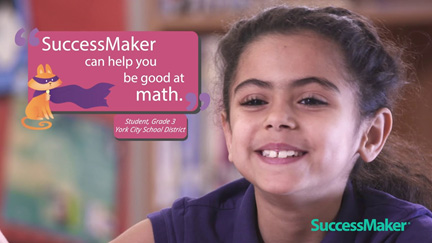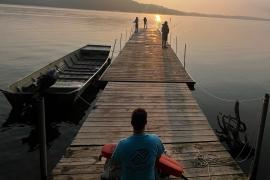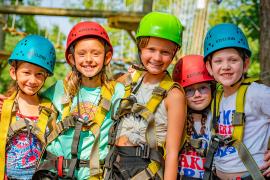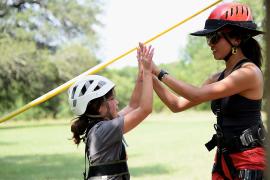I have been an EdTech executive for the past 15 years, mostly focused on getting kids prepared for and through college and their first jobs. I led the largest product at the largest educational publisher at a time when the education world was just starting to “go digital.” I am also a lover of summer camp, having been blessed by my years at Camp Kenwood in the 1970s and watching my kids grow from young campers to counselors in their day programs, where my wife taught tennis.
For years, I saw those worlds as entirely separate. The world of education technology was all about how to bring to scale the personalized learning experience that a good tutor provides, but ensure that everyone in the world could have such experiences. The world of summer camp was about unplugging, where the notions of competition and achievement centered on color war and intercamp, not grades and college readiness. Technology training meant learning to paddle a canoe or throw a pot of clay. Learning pathways were trails in the woods marked with ribbons. And social distancing was the hope of counselors and the foe of young campers during that “slow dance” to end the evening.
Whatever your notion of summer and summer camp is, COVID-19 has altered the view. Not only has it affected our summer programs, but it has chipped away at this current school semester just finishing, and it threatens to impact fall academic plans.
This has introduced new stressors to school-aged children and their families. If we thought summer learning loss was a problem in the US before, many children now risk a structural shift in their learning and development. Some are resilient and will do just fine through this crisis. But what of those who depend on the structure and support of school to help them advance? What of those who are teetering between staying on grade level and falling behind?
For them, this summer is not just a time to unwind and relax. Many are bored stiff now that they don’t have time with friends and activities at school to fill their days. An increasing burden has fallen to parents to keep kids engaged and moving forward, and even the best are admitting that they can barely handle the addition of these newfound responsibilities.
When the COVID-19 wave hit schools this spring, we feared what the next wave would do to camps.
Last month, a few of us started discussing these concerns about what would happen to summer camp if the COVID-19 shutdown lasted into June or July. We were being called upon to help schools and colleges make the rapid shift to virtual programming, and even the best districts and schools were at a loss. I called people in the camping industry I knew, and they suspected that summer camp 2020 might well be a casualty of our necessary responses to this nasty virus.
We realized that camps might need the same kind of help that we were giving to academic programs; however, they would have neither the time nor the expertise to respond. To get a sense of the situation, we put a quick survey together and got it to several dozen organizations in the Association of Independent Schools of New England (AISNE) network. Most of these schools convert to summer camps — and rely heavily on this revenue — so we thought this survey would be relevant.
We surveyed 31 summer programs on their 2020 plans and their needs in that context.
The survey had two areas of inquiry: plans and needs. We wanted to know what people were planning to do — tough it out, shut down, go virtual, or a combination of these — and what help they might need this summer. Despite busy schedules, we got a healthy response (over 30 camp administrators in a week). Here is what we heard:
Program plans are up in the air due to lack of guidance and safety protocols. This uncertainty resulted in nearly 20 percent of programs throwing in the towel for 2020. Another 42 percent were still trying to decide whether to have any program at all. Thirty-five percent were committed to summer programming but were still trying to figure out what they would offer. Only one of the programs felt like they were clear about their program — only a month out from the traditional start of camp.
This uncertainty has led a growing majority of camps to consider virtual activities. One-third were firmly against virtual on a philosophical basis. Thirty-seven percent were looking to minimize online activities, but recognized it must be part of their plans. The remaining 30 percent saw online as an opportunity to enrich their programming (for example, global connections or academic enrichment).
Most of the camps planning to run virtual programming would supplement their core program. While 38 percent planned to supplement their core program with technology, almost half as many (17 percent) planned to rely on virtual programming as part of their core program — or the entirety of it. Given that these are camps where technology is not at the heart of the traditional value proposition (and, I dare say, antithetical to tech), it was somewhat surprising that more than 1 in 6 of these camps were going “all in” on virtual programs.
The #1 need for help this summer is academic enrichment. This was quite surprising, as these are not academic programs. Yet, it seems clear that they understand that, at the heart of this summer is not unplugging and letting loose — things that may be, in fact, prohibited in places — but the need to lean into a summer of learning, remediation, and advancement.
I believe the camps that embrace this unwelcome but essential mission might have the greatest impact on families, provide the most memorable experiences for kids, and do the country a great service in the process. In 2020, camps can enable an essential academic reset and reboot that many of our kids need from kindergarten up. Their intellectual development has been put at risk, and the less resilient are particularly vulnerable to losing ground, making future academic years a steeper climb.
Summer 2020 must provide opportunities for our children to invest in their learning.
Imagine how encouraged and empowered a kid will feel if they were given the opportunity to engage in topics they need to know or want to know — math, language arts, science, robotics — without the academic pressure of performance. What if that counselor, whom the child calls by first name, was able to help them get back on track just by encouraging them to participate in some virtual learning challenges?

Pearson’s SuccessMaker helps kids avoid summer learning loss.
How you can make an impact on academic enrichment through virtual experiences this summer
Here are four tangible ways we have found that you can make an impact on learning this summer:
- Support professional development in virtual learning for your staff. We have all learned that there is both art and science to even a simple Zoom meeting. Not everyone does it well. But the educational technology sector — both educators and vendors — have billions of hours of experience on what works and what does not. Help your staff and administrators get smart on virtual learning and EdTech.
- Deputize your tech-savvy staff. You probably have staff who do this for a living but might never share that with you in a summer camp context. Now is the time to deputize them as subject matter experts amidst your staff. Use them to scout out opportunities to go virtual, and let them help others who might be intimidated by the technology. The success of EdTech deployments are a function not of the products themselves, but of the peer support networks that make the technology waters “safe” to swim in.
- Help to make learning a game. The National Education Foundation (NEF, our organization) has discovered that, when it wraps Pearson’s SuccessMaker learning platform for K–8 students with fun and incentives, resulting in substantial gains in math and reading at every grade level. The technology enables personalized student learning, while recognition, collaboration, prizes for effort and achievement all serve to motivate kids to do what they otherwise might not — a dynamic every good camp knows how to create. NEF and the State University of New York (SUNY) have partnered to host a summer inter-camp edition of its Minecraft Competition. WozEd, founded by Apple co-founder Steve Wozniak, has created several project-based activities that can be done at home, ranging from animation and film editing to cybersecurity and mobile app development. Providing venues for kids to share their work and learn from each other creates an engine of motivation that unlocks a love for learning.
- Promote summer learning opportunities to your families. You may not have time to redesign your program around virtual experiences, but you can certainly supplement them by promoting virtual learning experiences to your families. There are many great options, and NEF is even curating a set of “shovel-ready,” high-quality experiences that families can use at home or camps can integrate into their programs. With increasing parent anxiety about the learning impact of COVID-19 crisis on their children, you will be offering families an invaluable service if you connect them to resources that can help stem that loss, or possibly create opportunities for acceleration. It is hard for families to motivate kids to do academic work, and even more so in the summer. But camps can make learning fun in ways families will struggle to do.
WozEd is a partner in NEF’s Virtual Summer Experience Exchange
The NEF Virtual Summer Learning Exchange
NEF’s passion is learning improvement at every grade level. The camps we surveyed overwhelmingly asked for some sort of academic enrichment or skills development opportunities. We believe there are more camps out there like the ones we surveyed, who are looking to go virtual but are not sure what to do or how to do it.
That is why we have launched the NEF Virtual Summer Learning Exchange. It is a growing consortium of organizations, companies, programs, and passionate enthusiasts that want to make sure kids have access to what they need this summer, whether physical distancing keeps us from traditional summer programming. We are offering free and for-fee virtual programming options for summer programs and the families they serve.
Summer programs can license these virtual experiences and make them part of their programs, or they can promote these experiences to their families. In consideration for promotion, programs will receive a contribution as a share of revenues.
If this call for summer learning speaks to you, join our community at open4learning.com/summer2020. There you can find information about the growing list of virtual programming options we are making available. You will also be able to participate in professional development webinars we will host throughout the Spring and Summer.
We wish you all the best this summer. Stay safe, stay well, and stay connected.
Bill Hughes is the executive director of the National Education Foundation’s Virtual Summer Learning Exchange. He is President of Open4 Learning, an educational technology advisory company, whose flagship business, (JobReady), is on a mission to reach the next million job seekers with affordable career training. Bill is a proud member of the 1978 Camp Kenwood Shield of Honor.
Images courtesy of the National Education Foundation, WozEd, Pearson
The views and opinions expressed by contributors are their own and do not necessarily reflect the views of the American Camp Association or ACA employees.




